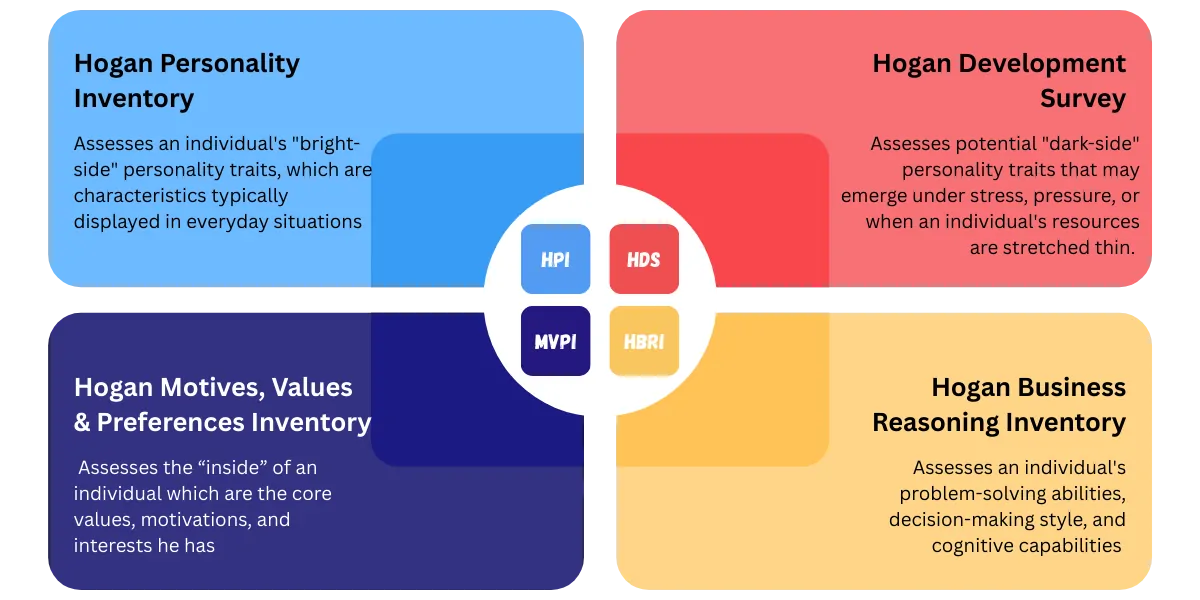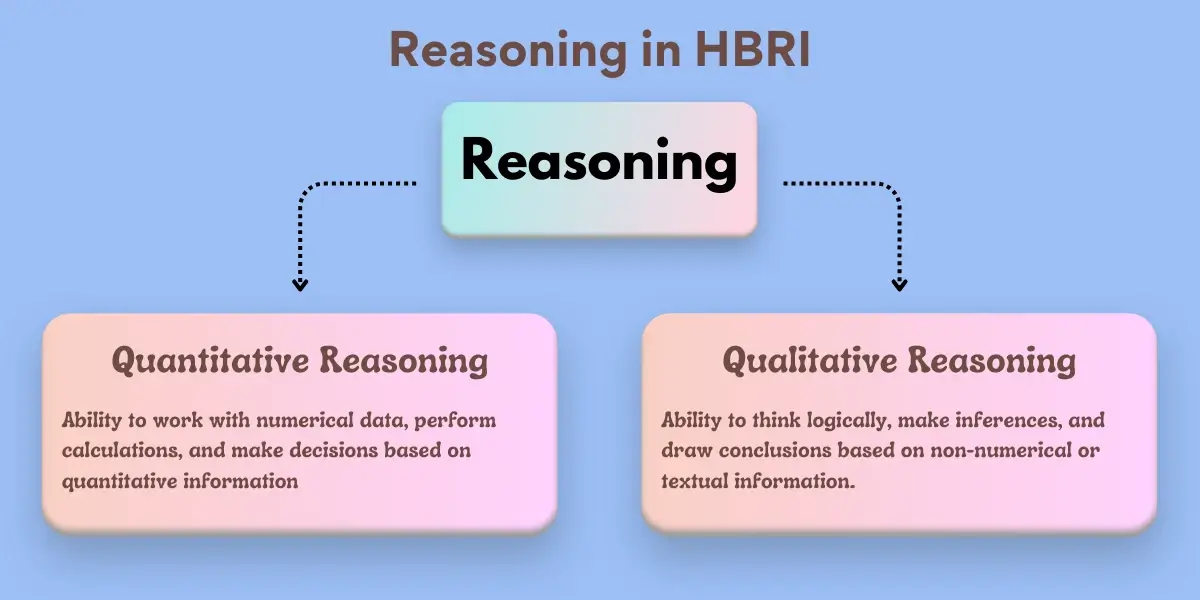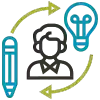Ace the Hogan Assessment 2025: Complete Prep Package
- Overview
- Curriculum
- FAQs
In 2025, organizations are looking for more than just technical skills — they want people who can adapt, think critically, and collaborate effectively. That’s why assessments have become a standard part of the hiring process. Some evaluate math or language abilities, while others focus on decision-making, problem-solving, and judgment.
Beyond the clear-cut tests with right and wrong answers, there are also personality assessments. These explore your traits, values, and strengths to show how you approach challenges and work with others. They’re less about passing or failing, and more about understanding your potential.
Hogan Assessments stand out here. They provide a science-backed way to connect personality with workplace performance — helping organizations predict how candidates are likely to lead, communicate, and adapt. For individuals, Hogan is an opportunity to showcase unique strengths, uncover areas for growth, and gain insights that support long-term career success.
What is Hogan?
Hogan Assessments is a global leader in personality-based workplace testing. Their assessments are used by organizations worldwide for hiring, leadership development, and talent management.
Instead of measuring technical knowledge, Hogan focuses on the human side of performance — personality traits, values, and behaviors that shape how people work with others and handle challenges.
Through this approach, Hogan enables companies to build smarter, stronger teams and gives individuals the chance to understand themselves more deeply. In the sections ahead, we’ll break down the most common Hogan assessments employers rely on.
Major Hogan Assessments
Let’s understand the four major workplace assessments:

Hogan Personality Inventory (HPI)
The Hogan Personality Inventory (HPI) is a leading personality assessment designed to measure the “bright side” of personality — the qualities that influence how people typically behave at work and in everyday life.
Organizations use the HPI to anticipate how individuals are likely to collaborate, lead, manage stress, and contribute to team success. It is widely applied in hiring, leadership development, and coaching.
The HPI is based on the Five-Factor Model (FFM) of personality, a widely validated psychological framework:
- Openness to Experience: refers to a person’s openness, curiosity, imagination, and willingness to explore new ideas and experiences.
- Conscientiousness: refers to the extent to which an individual is organized, dependable, disciplined, and responsible.
- Extraversion: refers to an individual’s level of sociability, assertiveness, energy level, and enthusiasm in social interactions.
- Agreeableness: refers to a person’s tendency to be empathetic, cooperative, compassionate, and how well they get along well with others.
- Neuroticism (Emotional Stability): refers to the degree of emotional stability or vulnerability to negative emotions such as anxiety, stress, and mood swings
The HPI refines these into practical, workplace-focused traits.
| Primary Scales | What it Assesses? |
|---|---|
| Adjustment | Evaluates your emotional stability, resilience, and ability to cope with stress. |
| Ambition | Examines your drive to achieve, compete, and succeed. |
| Sociability | Evaluates your comfort and effectiveness in social interactions |
| Interpersonal Sensitivity | Examines your ability to empathize, understanding others’ emotions, and interpersonal effectiveness |
| Prudence | Reflects conscientiousness, attention to detail, and responsible behavior |
| Inquisitive | Assesses curiosity, openness to new ideas, and a willingness to explore |
| Learning Approach | Evaluates your eagerness to learn, ability to adapt, and openness to feedback. |
In addition to the primary scales, the HPI also includes a set of occupational scales that provide insights into an individual’s fit for specific job roles. These scales consider the alignment between an individual’s personality traits and the competencies required for success in various occupations:
| Occupational Scales | What it Entails? |
|---|---|
| Service Orientation | being attentive, pleasant, and courteous to customers |
| Stress Tolerance | being able to handle stress, even-tempered, and calm under fire |
| Reliability | honesty, integrity, and positive organizational citizenship |
| Clerical Potential | follows directions, pays attention to detail, and communicates clearly |
| Sales Potential | energy, social skills, and the ability to solve problems for customers |
| Managerial Potential | leadership ability, planning, and decision-making skills |
Pattern
Hogan Personality Inventory consists of 206 multiple-choice questions and usually takes 15-20 minutes to complete. The test uses 7 primary scales and 42 subscales to assess the person.
Hogan Development Survey (HDS)
The HDS dives into the potential “dark side” of personality traits that might pop up when stress hits the fan or resources run thin. It helps spot behaviors that could mess with performance and teamwork. Companies use it to pinpoint issues and then provide tailored coaching and development to iron out those wrinkles.
When we say “Dark side” traits, we mean the aspects of personality that may become problematic or counterproductive under certain conditions. Here are the main domains assessed by the HDS:
| Domains | What it Assesses? |
|---|---|
| Excitable | The amount of enthusiasm and passion an employee shows at work; and their tendency to get frustrated and give up |
| Skeptical | How trusting a person is and whether they can identify and deal with deceptiveness in others. |
| Cautious | How risk averse a person is, their attitude to failing and if they can accept criticism. |
| Reserved | Whether a person take the feelings of others into account, how sociable they are and their tendency to act with indifference. |
| Leisurely | Whether a person is likely to act as if they are working as part of a team when in fact following a personal agenda and disregarding other people’s ideas or assuming that they know best. |
| Bold | How confident and fearless a person is. People who score highly may struggle to admit mistakes or learn from others or even from their own experience. |
| Mischievous | This looks for impulsive and risky behaviors |
| Colorful | Whether a person enjoys being the center of attention and how extroverted they are |
| Imaginative | This part of the test assesses creativity and creative thinking. |
| Diligent | How hardworking and detail-focused a person is |
| Dutiful | How compliant and eager to please a person is |
Pattern
HDS is a self-report survey, which consists of 168-170 questions, and usually takes 15-20 minutes to complete. The test uses 11 personality scales and 33 subscales to measure your strengths, weaknesses, and leadership abilities that indicate the likelihood of showing problematic behaviors in the workplace.
The responses are usually on a Likert-type scale, where you need to rate the statements on a scale from “Strongly Disagree” to “Strongly Agree.”
Motives, Values, Preferences Inventory (MVPI)
This one’s a bit deeper—it looks into a person’s core values, motivations, and what really floats their boat in their work. It’s all about figuring out what drives individuals and what gives their job meaning. Businesses use the MVPI to match up personal values with company goals, boost job satisfaction, and make smart decisions about roles and career paths.
MVPI includes 10 main scales and 5 themes in each scale:
| Scales | What it Assesses? |
|---|---|
| Recognition | Measures desire to receive attention, approval, and praise |
| Power | Measures desire for success, accomplishment, status, and control |
| Hedonism | Measures orientation for fun, pleasure, and enjoyment |
| Altruistic | Measures desire to help others and contribute to improvement of society |
| Affiliation | Measures your need and preference for social interaction |
| Tradition | Measures dedication to strong personal beliefs |
| Security | Measures need for predictability, structure, and order |
| Commerce | Measures interest in money, profits, investment, and business opportunities |
| Aesthetics | Measures need for self-expression, concern over look, feel, and design of work products |
| Science | Measures interest in knowledge, research, technology, and innovation |
Below is the table of themes and what it assesses in Organizational sense:
| Themes | Description |
|---|---|
| Lifestyle | Focuses on how well your personal values, motivations, and preferences align with the organizational culture and lifestyle |
| Beliefs | Focuses on your alignment with the core values, ethics, and belief systems of the organization. |
| Occupational Preferences | Examines the extent to which your preferences match the roles, tasks, and responsibilities within the organization |
| Aversions | Identifies aspects you may want to avoid or find challenging within the organization. |
| Preferred Associates | Gauges your compatibility with colleagues and team members within the organization. |
Pattern
The MVPI typically consists of a questionnaire or survey where individuals are asked to rate statements or scenarios based on their personal preferences and attitudes. The MVPI contains 200 items in the form of statements with which respondents indicate whether they agree, are uncertain, or disagree.
Hogan Business Reasoning Inventory (HBRI)
The HBRI takes a look at how someone handles complex business situations. It’s like a cognitive fitness test for decision-making, problem-solving, and general brainpower in a business context. It helps companies understand an individual’s ability to analyze info, make informed decisions, and adapt to ever-changing business challenges.
There are two types of reasoning involved in HBRI-

Quantitative reasoning is essential for roles that involve financial analysis, budgeting, data analysis, and any situation where individuals need to make decisions based on numerical information. Qualitative reasoning is crucial for roles that require the interpretation of written materials, critical thinking, and decision-making based on textual or non-numerical data.
HBRI provides a comprehensive assessment of a person’s reasoning abilities, allowing organizations to make informed decisions about talent selection and development. It assesses your cognitive skills of numerical, verbal, abstract, logical reasoning, problem-solving skills, decision-making skills, ability to think critically, time management, data interpretation, and attention to detail.
Pattern
The exact number of questions on the Hogan Business Reasoning Inventory (HBRI) may vary depending on the version and customization used for specific assessments. However, the HBRI typically consists of a moderate number of questions. The response format for the HBRI questions typically includes multiple-choice options. You are presented with a question or scenario, and you choose the correct answer from the provided options. Some questions may have more than one correct answer, requiring you to select multiple options. Test-takers are required to analyze the information provided and make decisions based on it.
| Question Type | Question Format |
|---|---|
| Numerical Reasoning | Numerical reasoning questions typically involve mathematical calculations or data analysis. You might be presented with numerical data, such as financial statements or charts, and asked to answer questions or solve problems based on that data. |
| Verbal Reasoning | Verbal reasoning questions involve reading and interpreting written information. You might be given a passage of text, such as a business report or memo, and asked questions related to the content, main ideas, or logical inferences. |
| Abstract Reasoning | Abstract reasoning questions often present sequences of shapes, patterns, or symbols. Your task is to identify the underlying logic or pattern and predict the next element in the sequence. |
| Logical Reasoning | Logical reasoning questions may present scenarios or puzzles that require deductive or logical thinking to arrive at the correct answer. These questions assess your ability to make logical connections and solve problems |
| Problem-Solving Abilities | Problem-solving questions typically involve real-world business scenarios or challenges. You may need to analyze the situation, consider various options, and select the most appropriate solution. |
In a nutshell, these assessments are like Swiss Army knives for organizations, helping them understand, develop, and make smart decisions about their people in the workplace.

Hogan Master Prep Course
Last Updated: Sep 23, 2025
Course Content
-
 Introduction to Hogan Assessments 2 Steps - 20 MinutesBuy this Course: Get full access to all lessons, practice tests and guides.
Introduction to Hogan Assessments 2 Steps - 20 MinutesBuy this Course: Get full access to all lessons, practice tests and guides. -
 Hogan Personality Inventory (HPI) 5 Steps - 3 Hours 45 MinutesBuy this Course: Get full access to all lessons, practice tests and guides.
Hogan Personality Inventory (HPI) 5 Steps - 3 Hours 45 MinutesBuy this Course: Get full access to all lessons, practice tests and guides. -
 Hogan Personality Inventory - Practice Questions 2 Steps - 1 Hour 10 MinutesBuy this Course: Get full access to all lessons, practice tests and guides.
Hogan Personality Inventory - Practice Questions 2 Steps - 1 Hour 10 MinutesBuy this Course: Get full access to all lessons, practice tests and guides. -
 Hogan Personality Inventory - Quiz 2 Steps - 1 Hour 30 MinutesBuy this Course: Get full access to all lessons, practice tests and guides.
Hogan Personality Inventory - Quiz 2 Steps - 1 Hour 30 MinutesBuy this Course: Get full access to all lessons, practice tests and guides. -
 Hogan Development Survey (HDS) 3 Steps - 1 Hour 50 MinutesBuy this Course: Get full access to all lessons, practice tests and guides.
Hogan Development Survey (HDS) 3 Steps - 1 Hour 50 MinutesBuy this Course: Get full access to all lessons, practice tests and guides. -
 Hogan Development Survey - Practice Questions 2 Steps - 1 Hour 30 MinutesBuy this Course: Get full access to all lessons, practice tests and guides.
Hogan Development Survey - Practice Questions 2 Steps - 1 Hour 30 MinutesBuy this Course: Get full access to all lessons, practice tests and guides. -
 Hogan Development Survey - Quiz 2 Steps - 1 Hour 50 MinutesBuy this Course: Get full access to all lessons, practice tests and guides.
Hogan Development Survey - Quiz 2 Steps - 1 Hour 50 MinutesBuy this Course: Get full access to all lessons, practice tests and guides. -
 Motives, Values, Preferences Inventory (MVPI) 3 Steps - 1 Hour 50 MinutesBuy this Course: Get full access to all lessons, practice tests and guides.
Motives, Values, Preferences Inventory (MVPI) 3 Steps - 1 Hour 50 MinutesBuy this Course: Get full access to all lessons, practice tests and guides. -
 Motives, Values, Preferences Inventory - Practice Questions 2 Steps - 2 Hours 15 MinutesBuy this Course: Get full access to all lessons, practice tests and guides.
Motives, Values, Preferences Inventory - Practice Questions 2 Steps - 2 Hours 15 MinutesBuy this Course: Get full access to all lessons, practice tests and guides. -
 Motives, Values, Preferences Inventory - Quiz 2 Steps - 2 Hours 15 MinutesBuy this Course: Get full access to all lessons, practice tests and guides.
Motives, Values, Preferences Inventory - Quiz 2 Steps - 2 Hours 15 MinutesBuy this Course: Get full access to all lessons, practice tests and guides. -
 Hogan Business Reasoning Inventory (HBRI) 1 Step - 15 MinutesBuy this Course: Get full access to all lessons, practice tests and guides.
Hogan Business Reasoning Inventory (HBRI) 1 Step - 15 MinutesBuy this Course: Get full access to all lessons, practice tests and guides. -
 HBRI - Verbal Reasoning 5 Steps - 1 Hours 35 MinutesBuy this Course: Get full access to all lessons, practice tests and guides.
HBRI - Verbal Reasoning 5 Steps - 1 Hours 35 MinutesBuy this Course: Get full access to all lessons, practice tests and guides. -
 HBRI - Numerical Reasoning 4 Steps - 2 Hours 15 MinutesBuy this Course: Get full access to all lessons, practice tests and guides.
HBRI - Numerical Reasoning 4 Steps - 2 Hours 15 MinutesBuy this Course: Get full access to all lessons, practice tests and guides. -
 HBRI - Logical Reasoning 2 Steps - 1 Hours 5 MinutesBuy this Course: Get full access to all lessons, practice tests and guides.
HBRI - Logical Reasoning 2 Steps - 1 Hours 5 MinutesBuy this Course: Get full access to all lessons, practice tests and guides. -
 HBRI - Abstract Reasoning 4 Steps - 2 Hours 35 MinutesBuy this Course: Get full access to all lessons, practice tests and guides.
HBRI - Abstract Reasoning 4 Steps - 2 Hours 35 MinutesBuy this Course: Get full access to all lessons, practice tests and guides. -
 HBRI - Practice Quiz 2 StepsBuy this Course: Get full access to all lessons, practice tests and guides.
HBRI - Practice Quiz 2 StepsBuy this Course: Get full access to all lessons, practice tests and guides.
What can you Expect In Our Prep Course
Unveil Your Potential with These Exciting Features:
- 📚 Comprehensive Prep Guide: Contains curated guides for HPI, HDS, MVPI & HBRI.
- 🔍 In-Depth Domain Insights: Explore hidden connections between your Personality Traits & Reasoning.
- 📊 Score Clarity: Understand your results with a detailed explanation of what your scores really mean.
- 🧠 850+ Personality Practice Questions: An extensive library of practice questions oriented towards HPI, HDS & MVPI.
- 💯 220+ Reasoning Practice Questions: An extensive library of practice questions oriented towards HBRI.
Ready to unlock your potential and align with your ideal job? Enroll now!
Success Stories
4.7 357 Reviews
rob, 16 Jan
Solid review course that covers the…
Solid review course that covers the relevant topics in good detail
chad, 11 Jan
Great Program, amazing practice simulations
Easy to understand. Passed tests on first time thru.
QUEEN RIGHTEOUS, 07 Jan
Highly recommended.Great instructional…
Highly recommended.Great instructional information. I passed on the first try.
Erik Todd, 19 Dec
I was apprehensive at first about the…
I was apprehensive at first about the training, but decided to take a leap and try it. Certainly gave me an overall understanding of the assessment so I more confidently answered the questions in the actual assessment. I found it very useful as a practice to lower test anxiety and feel more confident in how I answered questions
MasterCommand, 14 Nov
Prepterminal. Prepare, practice, execute.
To say that Prepterminal helped me prepare and be ready for the testing phase would be an understatement. At first, looking at the course, I felt overwhelmed with the course material, but the course broke down each subject effectively which made it easier to understand. There were a few issues with some of the audio portion of the testing course, but beyond that, the course was well worth the money.
Abazix LLC, 09 Nov
Would recommend
Study material helped to pass my test on the first try.
Frequently Asked Questions (FAQ’s)
While we aim to familiarize you with the concepts and question pattern to enhance your knowledge and guide you into success, we cannot guarantee a specific score or selection. It depends on multitude of factors such as organization criteria, your individual characteristics and awareness etc.
Our comprehensive Hogan Prep course is for anybody who is curious about the assessment, specifically it can be beneficial to job applicants who have been asked to take any of the Hogan test as part of their application, candidates for internal progression within their company who have been asked to take any specific Hogan test and individuals who would like to learn how to improve their score
Hogan Assessments are used for various purposes in organizational and workplace settings:
- Employee Selection and Hiring: Organizations use Hogan assessments during the hiring process to evaluate candidates’ suitability for specific roles. By assessing a candidate’s personality traits, such as leadership potential, interpersonal skills, and work style, employers can make more informed decisions about whether a candidate is a good fit for a particular job.
- Development: Hogan assessments are also used for leadership and professional development. Individuals can gain insights into their strengths and areas for improvement, helping them understand their leadership style, communication preferences, and ways to enhance their performance and effectiveness in their roles.
- Team Building: Hogan assessments can aid in creating balanced and effective teams by understanding the diversity of personality traits within a group. This can help in assigning roles and responsibilities based on individual strengths and reducing potential conflicts.
- Succession Planning: Organizations often use Hogan assessments to identify high-potential employees for leadership positions. By assessing individuals’ personality traits, organizations can identify those who possess the qualities and behaviors required for successful leadership roles.
- Coaching and Feedback: These assessment results are like a starting point for conversations between managers and employees. By discussing the personality traits identified in the assessment, managers, and employees can develop strategies to leverage strengths and address challenges. It’s all about helping employees grow and do better at their jobs.

Created by: Tanoo Purohit
MSc - Clinical Psychology, Psychometric Tutor, Prepterminal Test Expert
2587 students, 4.7, 357 Reviews
I’m Tanoo Purohit, with a BA honors and an MSc in Clinical Psychology from the renowned National Forensic Sciences University. Over seven years, I’ve studied the intricacies of the human psyche (as a part of my curriculum and practice). Proudly associated with PrepTerminal, I serve as a Psychometric Course Author and am recognized as a Psychological Test Expert. In every course I craft, I merge my expansive knowledge with relatable insights, ensuring that complex psychological concepts are presented with clarity and resonance for all learners. Feel free to contact me at [email protected].
